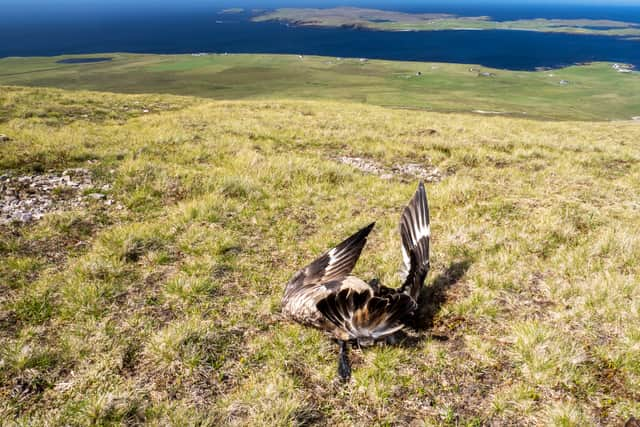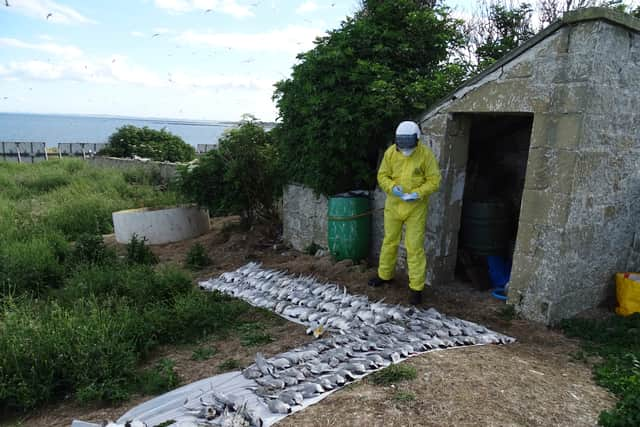Bird flu: conservation charities call for government help as thousands of at-risk UK seabirds die
and live on Freeview channel 276
The Royal Society for the Protection of Birds is calling for the UK's governments to urgently publish their long overdue Seabird Conservation Strategy - as thousands of vulnerable birds fall victim to a deadly flu.
This marks the third year in a row that a Highly Pathogenic Avian Influenza - also called avian or bird flu - outbreak has swept through the UK's wild bird populations, and conservation charity RSPB warns that 21 of the UK’s 25 breeding seabird species have now tested positive for the virus.
Advertisement
Hide AdAdvertisement
Hide AdThe flu is pushing many seabird species to the brink, as the virus devastates colonies of species that were already recognised as needing urgent help - such as red-listed kittiwakes and amber-listed guillemots and tern species.
RSPB says an estimated 3,000 birds have been found dead as a result of the virus so far this year in its nature reserves alone. This on the back of 17,000 fatalities reported across RSPB sites in 2022.


Earlier this year 800 black-headed gulls were found dead at RSPB St Aidan’s, near Leeds, while 600 were suspected to have died due to avian flu at RSPB Saltholme near Middlesborough. Meanwhile, 20% of the breeding black-headed gull colony at Belfast Window on Wildlife was also lost.
RSPB policy director Jeff Knott said the additional pressure of avian flu on the UK's seabirds right now was "a cause for great concern".
Advertisement
Hide AdAdvertisement
Hide Ad"The cumulative three-year effect of this virus, on top of decades of declines amongst our seabirds, could potentially be catastrophic for some of our much loved, and most at risk, species," he said.
Many species had been seeing numbers plummet for years now, which RSPB attributed to "immense pressure" from other challenges at sea - like sandeel fishing, warming marine temperatures, and entanglement with discarded fishing gear.


“Our seabirds are in crisis, and this must be the moment that our governments step up to the challenge of addressing wider marine pressures and subsequent seabird declines," Mr Knott continued.
"There is no time to waste, and so all four governments of the UK must urgently publish their long overdue Seabird Conservation Plans to help build the resilience and long-term health of our seabirds."
Advertisement
Hide AdAdvertisement
Hide AdWithout robust measures to address the challenge the birds faced, "and with avian flu ripping across the UK as we speak" many seabird species risked disappearing from the UK's shores forever, he said.
Other victims of the bird flu have included great skua, gannets, arctic terns, common terns, roseate terns, sandwich terns, great black-backed gulls, and northern fulmar.
Recorded deaths have even included barnacle geese - which were recently recorded for the first time ever being hunted by white-tailed eagles on Sir David Attenborough's Wild Isles - as well as tiny oystercatcher chicks.
The frequency of infected seabird bodies washing up on beaches has even prompted UK's Health Security Agency to warn beachgoers that while the risk to humans is “very low”, they should keep dogs on leads and report sightings of dead or sick birds to the authorities.
Advertisement
Hide AdAdvertisement
Hide AdThe RSPB also warned Britons not to touch any sick or dead birds they find, but instead to use the online reporting system or call the Defra helpline (03459 33 55 77) if they find any dead wild birds, and make a report.
Comment Guidelines
National World encourages reader discussion on our stories. User feedback, insights and back-and-forth exchanges add a rich layer of context to reporting. Please review our Community Guidelines before commenting.
